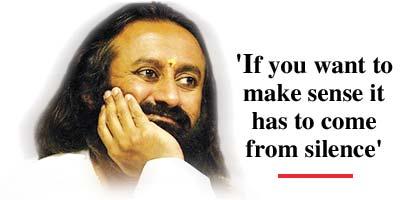Home > News > Interview
The Rediff Interview/Sri Sri Ravi Shankar
January 14, 2004

Twenty-one years after he emerged from a ten-day maun vrat -- the definitive period of his enlightenment, according to his followers -- Sri Sri Ravi Shankar is truly a global phenomenon.
He has built a multinational institution by teaching people the most elemental of ideas -- the art of living.
Gurudev, as he is affectionately called, travels to about 40 countries every year with his message of love and peace. "I want to see joy on every face," he says.
Senior Copy Editor Salil Kumar spoke to the guru at the home of one of his students in Thane, near Mumbai, this week.
What draws so many people to Sri Sri Ravi Shankar?
I don't know. I am yet to figure that out.
Has it got something to do with the fact that more and more people are moving away from churches and temples and are looking at alternative ways of healing?
People want to do something authentic, not just on the belief system, but on the experiential system.
So traditional spirituality does not offer that?
No, I don't say that. I don't think the rush in temples has reduced. There is rush in temples also; people are going there.
All these people who follow you -- is it based on belief, or is there a need?
They come because they have had an experience.
With?
With the Art of Living. They have found some relief in their lives, more love, joy, and enthusiasm. You saw the enthusiasm this evening [he granted darshan to an assembled crowd of followers just before the interview]. How enthusiastic they were. So once in a while when I come they come to express their gratitude. They are not coming to get something; they are coming to express their gratitude.
What about other spiritual leaders? We see so many godmen and religious figures who exploit people. Doesn't that make it a very delicate relationship?
You know, people are not such fools. They understand very well. If they don't get what they want they leave.
You have said you want to see joy on every face. Is that a desired state of existence for everyone?
That is a natural tendency. Rivers flow... water flows... similarly, the nature of joy is to spread.
Will that lead to a perfect world? Is it good to have a perfect world?
There is no need to paint a very rosy picture where there are no thorns. Society continues to have some thorns. You have to hold it where you have to hold it.
You have to make the goals and aims in your life clear if you want to improve society and quality of life. This is the aim of everyone, isn't it? Why do you want better buses, better homes, better gadgets? To make life better! [But] only by these amenities life cannot be better. You have to do a subjective analysis.
How important is silence to that analysis?
Very important. [It] makes your thought more coherent, makes you more intelligent. A person who does not practise silence cannot be intelligent at all. He keeps blabbering, blabbering all the time, thinking all the time, talking. What he talks makes very little sense. If you want to make sense, it has to come from silence.
Introspection leads to silence.
Why have you patented the Sudarshan Kriya?
Because someone else was going to patent it. We patented it so we could teach. Otherwise, it would have become a commercial commodity in the US long ago. People started copying it and we stepped in... [we started teaching it] free of cost in prisons, free of cost in many places.
But these techniques have been in existence for a long time.
Not this one. This is different. You have to experience it.
Photograph: Deepak Salvi | Imaging: Uday Kuckian